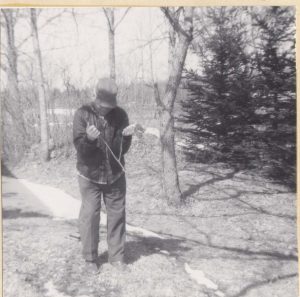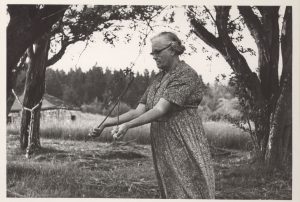Lincoln, “Dowsing in the Woods”
Story: “Dowsing in the Woods”
Storyteller: Kenneth Merrill
Town: Lincoln, ME
ID: NA1749 T1858
Collector: Sara Flipse
Date: April 27, 1984
Water covers more than 70% of the earth’s surface, and yet water can be difficult to find when one needs it. Moreover, even when people find water, it is often not fit to drink. Faced with the problem of non-potable water, humans have developed a number of solutions that generally involve altering water in some way (fermenting, boiling, or filtering, for example) or finding a new source. One of many methods within the latter option is addressed in the story heard here. Dowsing (or divining, water-witching, and many other names) is a way to find water or other materials underground by way of divination. There is no scientific proof or explanation for dowsing, but people have sworn by it for hundreds of years, and it was apparently a widespread practice in Maine and throughout the rest of the region. This is not to say that it works, or that it does not, just that people have been certain it works for a long time.

How does dowsing work? No one knows precisely, but the methods of dowsing are easy to describe in a general sense. A Y- or L-shaped twig or metal rod – called a dowsing rod, divining rod or witching rod – is most frequently used to locate a substance or object below ground, although some dowsers use other equipment or no equipment at all. In the case or Kenneth Merrill, the subterranean substance was water. Dowsers generally describe the water they find as a “vein.” Merrill mentions a “boiling spring,” which describes a point where a vein breaks through the surface. Unlike other types of springs, this does not mean the vein ends at the boiling spring, just that it breaks through the ground.
The process of dowsing varies widely, and Merrill was able to explain what worked for him and how he knew when he found water. His method consisted of almost any y-shaped branch – any green branch except ash, which he could not explain – held in front of the torso, pointing down, with his thumbs out. According to Merrill, when he was over a vein, the stick pulled downward and he would be unable to prevent it from doing so. Moreover, Merrill said he could judge how deep a vein was by measuring the distance from where he first felt the stick twitch to where it pulled all the way downward. That distance approximated the depth of the vein. In addition, some dowsers claim they can predict how strong the water is flowing by how forcefully the rod pulled. In the story here, Merrill used this skill to locate water while he and a friend were working in the woods. This was important as it was difficult to find good drinking water in the area.
A few final notes: As with all dowsers, Merrill faced a number of skeptics in his life. In some cases he was able to change minds, but not always. For many people, dowsing continues to strain credulity; even for a believer such as Merrill, the idea of map dowsing (locating water with just a map) was beyond belief. Merrill refers to “the Chain Lakes,” by which he likely means the Pemadumcook Chain of Lakes, in the Millinocket area. This would be close enough to his home in Carroll that he could return home on the weekends as described. Finally, there is a dog barking occasionally. This is “Pooh,” the Merrills’ dog.
Transcript:

When I worked in the woods, that was one great thing was to be able to find drinking water, because lake water would get pretty brackish along, late in the summer. It was pretty nice to find some real good drinking water. [Sara Flipse: Fresh, clean water anyway.]I know one spot down the Chain Lakes where we was working, – [SF: The Chain Lakes?] Chain Lakes -, the old people that worked there years and years ago, when they first lumbered in that country, I talked to some of the old people that did work there when they were young. They all say that there was no such thing to find a boiling spring or any decent water in that area. It was impossible to find decent water to drink; they always had to use lake water.
My partner and I was working there in that area. We were drinking lake water so we use to go, come home on weekends, and we stayed right down there in that little shack during the week. I told him, I said, “By gorry, I’m going to see if I can find some water.” He laughed at me. Well, I started out and got me a stick and I started along the foot of the ridge and my stick went down. So I had seen that it was down about five feet and it was rocky ground, awful rocky ground; be impossible to dig it out. So I told my partner, I said, “This weekend when we go out we’ve got to get some dynamite.” So, we went out and got some dynamite that next weekend, and went in and I cut a pole and we drove that pole down among the rocks as far as we could. And I put in a stick of dynamite and we blew it out. Of course, it blew out quite a hole so I sharpened my stick again and drove it again, and that time I got down pretty well, went in a couple of feet. So I put in two more sticks of dynamite and blew it again. And when we went back that time, the water was gushing right into it. So we took a shovel and cleaned it out the best we could. [SF: How far down was it?] We were down about five feet, we cleaned it out the best we could and we made a box, took some lumber and made a box about two feet square. Set it right down in there and then we put dirt in around it and we had us a beautiful spring there. We had about three feet of water in that box [SF: What was the box for, to keep the water clean?] Yeah, to keep the dirt out. That cleared right up and it was the nicest water and just as cold as ice; the nicest drinking water that you would ever see. That was in an area where the old people all claimed that there was no such a thing as running water. That fall, we had five horses in there and it furnished all the water for our camps and for those five horses, just from that spring.
[SF: You think there was quite a bit of water there?] There was all kind of water there, but it didn’t come out as a spring and you never would realize there was any vein there, just all dry and rocky ground. If it hadn’t been for my dowsing, no one would ever believe that there was water there.
